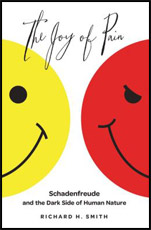"Christian traditions also include envy in the cast of the deadly sins. Although the pain of envy is its own kind of punishment, the consequences of the sin of envy are singularly unpleasant. In Dante's vision of Purgatory, the envious have their eyes sewn shut with wire. This seems fitting, for the root of the word envy derives from in- 'upon' + videre 'to see.' People feeling envy look at advantaged others with malice, casting an 'evil eye' upon them — and look with pleasure when misfortune strikes. Envy may also be a sin that catalyzes others. Christian philosopher George Aquaro makes the case for envy being the core emotion driving most sinful behaviors, the one that creates the necessity for other commandments. Without envy, Cain may not have murdered Abel. Alas, because the commandment to avoid envy may be impossible to follow, we must also have 'thou shalt not kill.'
"It doesn't take a scholar of religions to see that envy is likely to be a troublesome problem for any faith, and so religious beliefs must provide a palliative for those less fortunate. According to the Bible, Jesus said, 'Again I say to you, it is easier for a camel to go through the eye of a needle, than for a rich man to enter into the kingdom of God.' It is the meek rather than the wicked, powerful, and arrogant who will inherit the earth. This is good news for the disadvantaged person because it gives moral worth to inferiority and promises rewards for it in the long run. And yet the gnawing, immediate fact of disadvantage is hard to ignore in the moment. Inequality — and the envy that can result, regardless of commandments against the feeling — probably eats away at the foundations of a particular religion's explanation and justification for such inequalities. Envy signals a destabilizing discontent with one's lot that can place religious beliefs under suspicion and on shaky ground. The supreme being and creator of all things is implicated when envious discontent arises in response to his or her handiwork. Envy may initiate a questioning of the wisdom of the plan itself."
